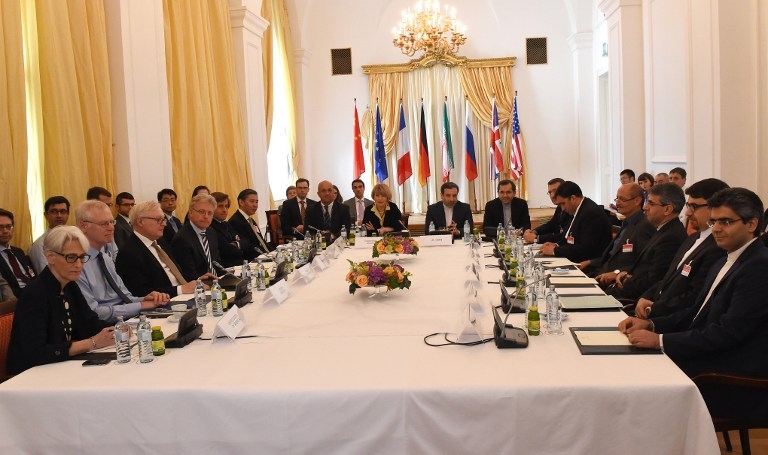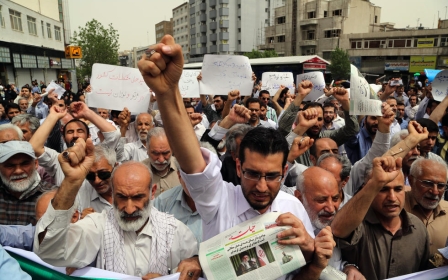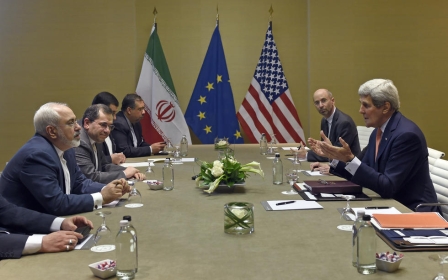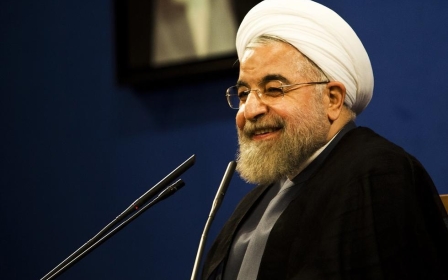Iran leader restates 'red lines' for nuclear deal

TEHRAN - Iran's supreme leader Ayatollah Ali Khamenei restated his country's red lines for a nuclear deal on Tuesday in a dramatic intervention during a meeting with President Hassan Rouhani and top officials.
Banking and other economic sanctions imposed by the UN and the US must be lifted "immediately" if a nuclear deal is signed, he said, according to a transcript posted on his official website.
Khamenei also said Iran would not allow inspections at military sites or "unconventional inspections" of other facilities, in remarks that follow demands from Britain and France that such access is a non-negotiable part of a verified deal.
"Inspection of our military sites is out of question and is one of our red lines," Khamenei said.
He also voiced distrust of UN inspectors who are expected to monitor Iran's nuclear activities and threw doubt on the duration of the framework agreement struck with world powers on 2 April.
"Unlike the insistence from the Americans, we do not accept long-term limitations of 10, 12 years, and we told them how many years (of) limitations we are ready to accept," said Khamenei, who has the final word for Iran on whether a deal is acceptable.
Mark Fitzpatrick, a non-proliferation expert at the International Institute for Strategic Studies, responded, saying, "Under additional protocol, IAEA [International Atomic Energy Agency] visits military sites elsewhere."
"Iran can't be granted opt-outs,” Fitzpatrick said, according to the Daily Telegraph.
Under the preliminary framework, Iran and the P5+1 powers said Iran's enrichment of uranium would be limited for 10 years and be conducted exclusively at its Natanz facility.
According to the transcript, Khamenei also said that Iran must be allowed to continue its nuclear research and development programme under any inspection regime and inspection period.
The supreme leader's statement came after Iran's parliament and Rouhani's government clashed on a bill passed by MPs, which, if adopted into law, would give it the power to ratify a deal or, if it so wished, to reject it as unsatisfactory.
In a signal of the significance of Tuesday's meeting, it was attended not only by Rouhani but also by his predecessor, Mahmoud Ahmadinejad, the hard-line conservative president under whom Iran's nuclear programme became a flashpoint issue for the West.
Talks between Iran's deputy foreign minister, Abbas Araghchi, and the political director of the EU diplomatic service, Helga Schmid, resumed in Vienna on Tuesday.
Talks entering final lap
Although Khamenei said he backed Iran's negotiators, headed by Foreign Minister Mohammad Javad Zarif, his sudden remarks so close to the deadline are likely to trigger strong reaction from opponents of a nuclear agreement with the Islamic Republic.
Those include Israel's Prime Minister Benjamin Netanyahu, who warned the US Congress in March against ratifying "a bad deal".
Rouhani, a moderate who aims to end Iran's diplomatic isolation, wants an accord that can lift sanctions that have hobbled the economy, but the bill passed by parliament earlier Tuesday underlined the resistance he faces.
One of his vice presidents, Majid Ansari, said the draft legislation, which still has to be signed into law by Iran's Guardian Council, was unconstitutional and would not help at "a sensitive point" in the talks.
"The engagement of MPs on this issue is of no help to the nuclear team and it could create problems in the negotiation process," he said.
The bill lays down terms for MPs' accepting a deal, but Ansari said any nuclear agreement was a defence and strategic issue reserved for Iran's Supreme National Security Council, a body of ministers, generals and Khamenei appointees.
It is chaired by Rouhani. Zarif is also a member.
Domestic critics of Rouhani's nuclear policy, including in the conservative-dominated parliament, say too many concessions have already been made in the talks and, using the bill, they demanded a bigger say.
Bargaining over a final deal intensified Monday when Britain and France reiterated that comprehensive inspections of Iran's nuclear facilities are essential to prove its nuclear activities do not have military dimensions.
Western powers have long suspected that Iran is covertly developing an atomic bomb, an allegation it vehemently denies.
President Barack Obama has given US lawmakers 30 days to review any deal.
New MEE newsletter: Jerusalem Dispatch
Sign up to get the latest insights and analysis on Israel-Palestine, alongside Turkey Unpacked and other MEE newsletters
Middle East Eye delivers independent and unrivalled coverage and analysis of the Middle East, North Africa and beyond. To learn more about republishing this content and the associated fees, please fill out this form. More about MEE can be found here.




